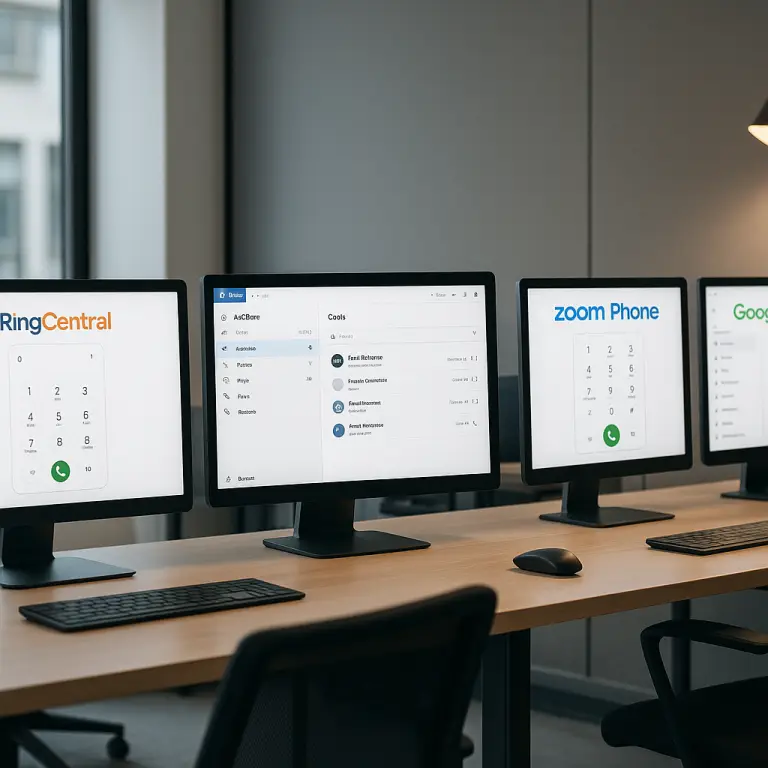RingCentral vs VoIP Alternatives: Choosing the Right Virtual Phone System for Your Business
When it comes to selecting the perfect virtual phone system for your business, the choice often narrows down to the dominant player, RingCentral, versus a host of viable VoIP alternatives. In this guide, we’ll compare RingCentral vs competitors like Nextiva, Zoom Phone, and Google Voice for Business. We’ll explore crucial aspects such as cost, features, and customer support to help you make an informed decision.
Understanding Virtual Phone Systems
A virtual phone system, also known as a VoIP or cloud phone system, is a revolutionary communication solution enabling businesses to make and receive calls over the internet instead of traditional landlines. This modern technology offers remarkable flexibility, allowing employees to use the same business phone number from any device with internet access—whether they’re at the office, working remotely, or traveling worldwide.
The elegance of these systems lies in their ability to convert voice into digital data packets, transmitting them over the internet, and converting them back into audio on the recipient’s side. This process provides clear and reliable calls, and with the entire infrastructure hosted in the cloud, businesses experience rapid scalability and minimal setup time.
Key Features to Compare: RingCentral vs Competitors
Before diving into the specifics of RingCentral vs VoIP alternatives, let’s look at some foundational features to consider when evaluating these systems:
- Advanced Call Routing: Direct calls to the right person or department efficiently using smart routing technologies.
- Auto-Attendant: Professional virtual receptionists that handle call directing with customizable greetings.
- Voicemail Transcription: Converts voicemails to text, enhancing accessibility and response time.
- Mobile Applications: Empowers your smartphone with full-featured calling capabilities.
- CRM Integration: Seamless integration with business tools like Salesforce, maximizing productivity.
- Video Conferencing: Host HD video meetings with robust participant and recording options.
Comparing Top VoIP Alternatives
RingCentral vs Nextiva
Nextiva offers a strong competitor to RingCentral with its highly acclaimed customer service and powerful feature set. While both provide similar functionalities like auto-attendant and call routing, Nextiva often edges out in terms of customer support and intuitive interface, making it a favorite among businesses requiring high-touch service and ease of use.
RingCentral vs Zoom Phone
For businesses already using Zoom for video conferencing, Zoom Phone presents an attractive integration opportunity within its ecosystem. Unlike RingCentral, which is a standalone platform excelling in unified communications, Zoom Phone integrates seamlessly with traditional phone systems and Zoom’s video service, enhancing cross-platform communication.
Google Voice for Business
Google Voice is a great option for small to medium-sized businesses looking for an economical and straightforward solution. While it might lack the advanced calling features of RingCentral, its integration with G Suite makes it appealing for organizations heavily embedded in Google’s ecosystem.
Navigating Common Pain Points
When selecting a virtual phone system, businesses frequently face challenges such as the complexity of setup, technical concerns, and decision-making quandaries due to feature overload. It’s crucial to assess whether a provider offers easy setup guides, robust customer support, and transparent pricing to mitigate these worries.
Additionally, consider the impact of internet dependency on call quality. Opt for providers with proven track records in delivering high-quality service with minimal disruptions.
Choosing the Right System for Your Business
The decision ultimately boils down to identifying what aligns best with your business needs—be it the robust feature suite of RingCentral, the customer-centric approach of Nextiva, the integration strengths of Zoom Phone, or the simplicity and G Suite synergy of Google Voice.
Leverage resources like the FCC VoIP Guide for authoritative insights on regulations and consumer rights in the VoIP sector. Additionally, review platforms like G2 provide peer reviews that could give you real-world perspectives on these services.
Conclusion: Taking the Next Step
Deciding between RingCentral vs VoIP Alternatives requires a nuanced understanding of each provider’s features and business alignment. Evaluate the trade-offs, consider long-term growth, and test these systems using free trials or demos. Choosing the right virtual phone system can significantly elevate your business operations, enhance customer interactions, and lead to transformative financial savings.
Ready to explore further? Contact us for more details or to set up a trial with your preferred provider today. Enhance your business communication with the right virtual phone system choice!







